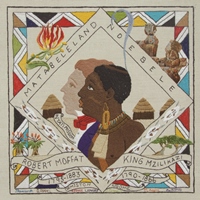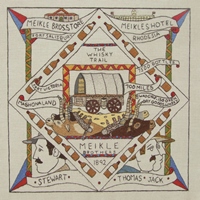|
ZW01 |
ZW02 |
British imperial ambitions in the south of Africa during the nineteenth century led to British settlement in what is now Zimbabwe. In 1898 the region was named Southern Rhodesia, after Cecil Rhodes who has spearheaded that activity. As happened elsewhere in southern Africa, Scots were amongst those who settled. Scottish place names can be found there today, including in suburbs of the capital Harare: Arcbennie, Braeside and Lochinvar being but a few. Scottish location names can also be identified around the second city, Bulawayo, which was established as a British settlement by the Scottish doctor and colonial politician Leander Starr Jameson in 1893. This was not the first Scottish influence in the area however.
Robert Moffat from Ormiston, East Lothian, had joined the London Missionary Society (‘LMS’) was sent to South Africa. After he married he moved to Griquatown and in 1824 founded Kuruman Mission in the Northern Cape amongst the Batswana people. Moffat learnt Setswana, the local language, translated and printed the Bible and developed his building, carpentry and blacksmithing skills. A group of the Matabele people, numbering less than 500, migrated in a meandering northward direction eventually across the Limpopo River establishing the Matabele Kingdom, within what is now Zimbabwe. In 1854 Moffat travelled 600-miles by ox-wagon to their new home near Bulawayo. He had already built a relationship with their leader Mzilikazi, who nevertheless had little time for Christianity and only accepted Moffat’s missionaries for strictly non-religious purposes: hoping to use them as agents for trade with South African white traders.
Moffat visited Matabeleland in 1857 preparing the way for an LMS mission and, in 1859, he accompanied the mission waiting until Nyati mission was firmly established. Mzilikazi and his successor, Lobengula, always gave protection to the missionaries remaining perceptive enough to distinguish between two aspects of western culture impacting on the Ndebele nation – Christianity and western medicine. The mission was unsuccessful with only two converts in the first 30 years. The Ndebele eagerly availed themselves of the material benefits of the missionaries but stood firm against Christianity. Mzilikazi died in 1868 and is buried in the Matopos, near Bulawayo. Only after Lobengula became King of the Matabele did the missionaries influence start to pay dividends for the British. Reasons for the attitude change towards foreigners are unclear but it seems Robert Moffat, followed by his son John Smith Moffat, was influential. Robert Moffat died in Kent in 1883 and is buried in London. Mzilikazi’s unique friendship with Moffat, two very different men, undoubtedly influenced the development of Zimbabwe. His descendants continued to contribute. His daughter Mary Moffat married David Livingstone, and his son John Smith Moffat, initially a missionary, became involved in British colonial expansion in Matabeleland. Moffat’s grandchildren included Howard Unwin Moffat and Emily Ruth Smith Tredgold: Howard became the second Premier of Southern Rhodesia and married Marion Meikle, sister of the three Scottish Meikle brothers, who founded Meikles trading empire. Great grandson Robert Clarkson Tredgold was a judge and politician, including Minister of Defense in Southern Rhodesia in World War Two.


